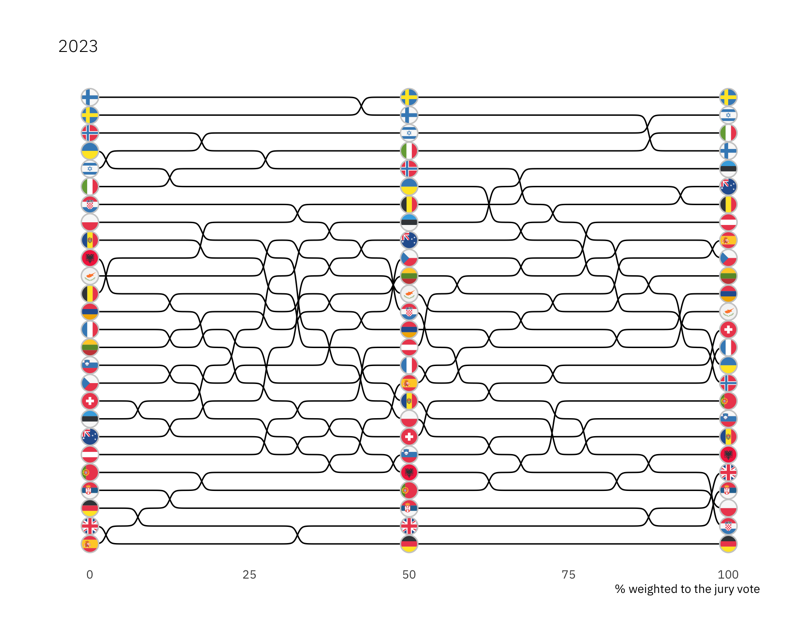Eurovision Voting Explained: From Jury To Televote

Table of Contents
The Two Pillars of Eurovision Voting: Jury and Televote
The Eurovision Song Contest uses a unique dual voting system: a 50/50 split between professional juries and the public televote. This balance aims to avoid bias and ensure a fair representation of both critical opinion and popular preference. The system's complexity often leads to fascinating and sometimes controversial results, adding to the show's appeal.
- Professional Juries: Each participating country has a jury composed of five music industry professionals – typically musicians, composers, and producers. These individuals are carefully selected to ensure diverse musical expertise.
- Public Televote: Viewers in each participating country can vote for their favorite acts via phone, SMS, or dedicated apps. This element brings the passion and enthusiasm of the fans directly into the voting process.
- Balanced System: The 50/50 split between jury and televote aims to provide a balanced score, mitigating potential biases inherent in either system alone. This ensures a blend of critical assessment and popular appeal determines the winner.
Understanding the Jury Vote in Eurovision
The jury vote in Eurovision is designed to prioritize musical merit and artistic quality. Each jury member independently scores each participating act, ensuring anonymity and preventing undue influence or collusion. This process ensures a level playing field and reduces potential bias.
- Individual Scoring: Each juror provides a score for each performance, contributing to a comprehensive assessment.
- National Jury Ranking: The individual scores are aggregated to produce a national jury ranking, representing the collective judgment of the professional panel.
- Conflict of Interest Rules: Strict rules are in place to avoid any conflict of interest, ensuring the integrity of the judging process. Jurors cannot have any ties to the competing acts or countries.
- Secrecy: Jury votes remain confidential until after the broadcast, preventing any outside pressure or manipulation of the results.
How Jury Voting Impacts Eurovision Results
The jury's weighted 50% contribution significantly impacts the final Eurovision results. A high jury score can provide a crucial boost to a country's overall ranking, potentially overcoming a less successful televote performance.
- Boosting Rankings: A strong showing with the juries can propel an act up the leaderboard, even if their televote results are more moderate.
- Discrepancies: Sometimes, significant discrepancies occur between the jury and televote rankings, leading to intriguing discussions and analysis of the voting process. This highlights the diverse tastes of professional critics versus the general public.
- Final Result Influence: The combined jury and televote scores determine the ultimate winner, highlighting the importance of appealing to both professional musicians and the broader viewing audience.
Decoding the Televote in Eurovision
The televote represents the voice of the Eurovision audience. Viewers across Europe and beyond can express their preferences using various methods, each with specific geographical restrictions and voting limits to ensure fairness.
- Voting Methods: The televote utilizes phone calls, SMS text messages, and dedicated voting apps, providing viewers with multiple ways to participate.
- Vote Tallying: The votes are meticulously tallied and weighted to create a national televote ranking, reflecting the popularity of each act amongst the viewing public.
- National Campaigns: National campaigns and strong fanbases play a significant role in influencing televote results, with well-organized fan groups actively promoting their preferred acts.
- Potential for National Bias: While the Eurovision voting system strives for impartiality, national bias can subtly influence televoting patterns. Neighboring countries might favor each other, for instance.
The Power of the Televote in Shaping Eurovision Outcomes
The televote can dramatically influence the final Eurovision outcome. A song with widespread appeal to the public can secure a high televote score, potentially offsetting lower jury rankings and securing victory.
- Televote Victories: Many past Eurovision winners have secured victory primarily due to an overwhelmingly strong televote, highlighting the public’s powerful influence.
- Social Media Impact: Social media campaigns and online mobilization have increasingly shaped televote results, demonstrating the power of online fan engagement.
- National Pride & Preference: National pride and audience preference for particular musical styles or performance styles significantly impact televoting patterns.
Addressing Potential Biases in Eurovision Voting
The Eurovision Song Contest continuously works to minimize bias and ensure the integrity of its voting system. Transparency and regulation are key to maintaining fairness.
- Transparency Measures: The non-disclosure of jury scores before the broadcast helps prevent external manipulation.
- Regulations to Prevent Manipulation: Strict regulations are in place to detect and prevent any attempt to manipulate the voting results.
- Ongoing Improvements: The Eurovision voting system is constantly reviewed and refined to address potential biases and improve its fairness and transparency.
Conclusion
The Eurovision voting system, with its blend of jury and televote, creates a dynamic and captivating contest. Understanding the intricacies of Eurovision voting – from the careful considerations of the juries to the raw energy of the televote – allows for a deeper appreciation of the competition's nuances. By understanding both the jury and televote components, you can better analyze the results and engage more fully with the excitement of Eurovision. So, dive deeper into the details of Eurovision voting and become a more informed fan!

Featured Posts
-
 Wnba Draft 2024 Paige Bueckers Expected Top Pick Status
May 19, 2025
Wnba Draft 2024 Paige Bueckers Expected Top Pick Status
May 19, 2025 -
 Adios A Juan Aguilera El Primer Espanol En Conquistar Un Masters 1000
May 19, 2025
Adios A Juan Aguilera El Primer Espanol En Conquistar Un Masters 1000
May 19, 2025 -
 Kelowna Bear Spray Incident Victims Speak Out On Halloween Night Assault
May 19, 2025
Kelowna Bear Spray Incident Victims Speak Out On Halloween Night Assault
May 19, 2025 -
 Real Madrid Responds To Mbappes Arsenal Performance With Bold Transfer Strategy
May 19, 2025
Real Madrid Responds To Mbappes Arsenal Performance With Bold Transfer Strategy
May 19, 2025 -
 Understanding China To Us Container Shipping With Payden And Rygel
May 19, 2025
Understanding China To Us Container Shipping With Payden And Rygel
May 19, 2025
